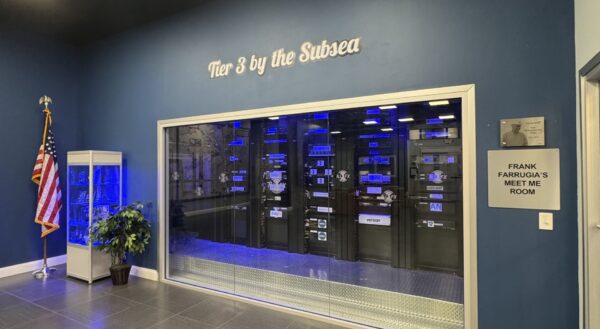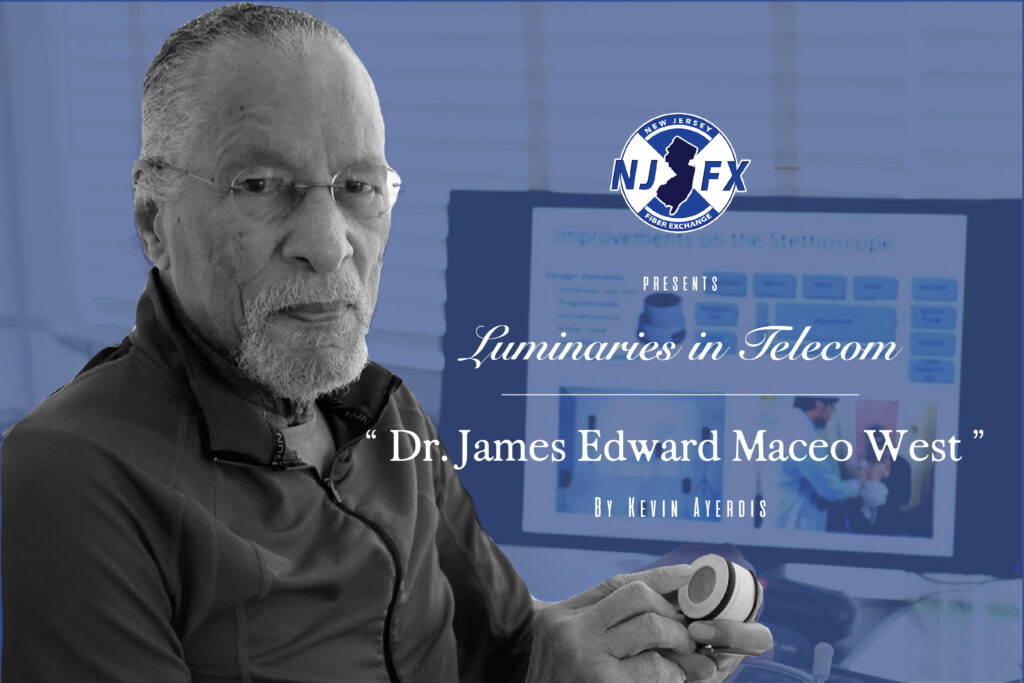
The AI-Ready Cable Landing Station is Coming
NJFX today announced the completion of a comprehensive Basis of Design for a new 10MW high-density AI data hall, delivering an expected 1.25 PUE and 8MW of usable IT load.
Kevin Ayerdis + Emily Newman
February 16, 2023

Hello and welcome back to Luminaries in Telecom!
This month’s feature is about an enduring telecom icon, who is not as well-known as he should be. He recently celebrated his 92nd birthday and is still going strong in the field! A simple question to start: Have you made a phone/Zoom call today, or maybe used anything with a microphone within the past week? I’m sure we all have multiple times just today, and we owe a huge thanks for that to our latest luminary. An enthusiastic educator and a revolutionary inventor, having been called “The Black Edison,” Dr. James Edward Maceo West’s work continues to change the world! He and his colleagues brought forth the evolution of the very way we communicate not just in the telecom industry but as a society. In this latest edition of NJFX’s Luminaries series, we’re eager to share all that we have learned and hope to shed some light on a little-known, but globally substantial piece of African American history.
West was born in 1931 at his grandparents’ home in Farmville, Virginia, since the local hospital would not admit African Americans, reflecting racial prejudice from the very start of his life. His grandmother, formerly enslaved herself, helped deliver him. From a young age, West was fascinated with how things worked and enjoyed tinkering. “If I had a screwdriver and a pair of pliers, anything that could be opened was in danger. I had this need to know what’s inside,” he said. At age 12, he took a job alongside his cousin installing electrical wiring in homes in rural Virginia. While plugging in an old radio he had been tinkering with, he received a painful and enlightening lesson: an electric shock turned on his unending fascination with electricity. “After that, I knew I needed to learn everything I could about it.”
Shortly after graduating high school in the late 1940s, West enrolled at Hampden University as a pre-med student. His parents urged him to study medicine, as they worried about future job prospects. At the time being an African American scientist in the South was difficult due to the institutionalized racism of the Jim Crow laws. While studying, he was drafted by the Army during the Korean War, where he received a Purple Heart. His time in the service had a profound effect on him, galvanizing him into continuing education, on his terms. West now knew he had to follow his passion despite his family and society’s concerns, enrolling at Temple University in Philadelphia to study physics.
Rejected from study groups due to his race to only be invited into their circles when he took it upon himself to solve complex problems alone that the groups couldn’t solve. Physics became the conduit that would lead to an opportunity for a summer internship at Bell Labs—a legendary New Jersey-based laboratory that’s been mentioned in other Luminaries careers. West would soon add to that legacy. Bell Labs especially attracted him at the time they were one of few scientific institutions that were open to hiring minorities, a rare occurrence during segregated times. “It was the fact that there were other people who looked like me that I wanted to be like when I grew up,” West said.
While an intern, West found “Link Hawkins” as an inspiration and mentor. Walter Lincoln Hawkins was the first African American member of the technical staff at Bell in 1945. This was monumental for the time as this was two years before Jackie Robinson made history as the first African American accepted into Major League Baseball, which is often seen as a pivotal moment in American race relations.
Still only a student intern, West noticed a problem: “How do things work; why is it possible to do some things and not others?” Recording devices, phones, radios, et cetera, were clunky, sounded garbled, and expensive. West remembers that on average the cost was $2,000 for a decent device; equivalent to today’s rate of purchasing power of more than $20,000!
West had become quite the audiophile and acoustician, all stemming from that jolt of curiosity those many years ago, and saw this as a worthy challenge. During his internship, he learned the value of mentorship, crossing paths and collaborating with anyone he could, He took turns mentoring his fellow colleagues—all the while gaining momentum that would inspire him to begin the design of what would become his magnum opus.
West received his bachelor’s degree in 1957. Upon graduating, West was offered a position at Bell, quickly resuming work on his project: the Electret microphone.
He soon after met and befriended Gerhard M. Sessler, beginning what would become a long-running partnership collaborating for years on his “student” project. The two became inseparable in their efforts; “We were always teased that when we were together, don’t even try to talk to them! They were in their own world!” Together they toiled for years on the project and after much effort in 1962, they invented and patented the world-changing Foil Electret Microphone. This type of condenser microphone changed how we hear the world forever.
It was exactly as West had envisioned: a more compact, durable, highly sensitive, and inexpensive microphone than anything produced previously. The duo coined “Electret” which stems from the combo of terms, electrostatic and magnetic. This microphone uses a thin foil material that has been permanently charged, eliminating the need for an external power source.
This has ever-expanding applications remaining a vital rooting component in the advancement of telecommunications — from Alexa and Siri answering your inquiries of the weekly forecast, to your tablet that syncs to your smartwatch reminding you that the meeting starts in a minute, even down to your gaming headphones helping you coordinate with your team in a Call of Duty match. The Electret Microphone helps you accomplish your daily tasks with all these items!
The revolutionary technology was widely adopted in 1968. Since then, roughly two billion microphones are produced yearly; the patent has been the basis for a staggering 90% of all microphones used for communications.
On what drives his perpetuity, Dr. West says, “Curiosity, curiosity…curiosity and curiosity!” This unending curiosity assisted in leveraging his positioning, building to gift others opportunities he was snubbed for early on.
He never wavered in collaboration, mentoring, and being mentored by colleagues from various departments throughout Bell all in the pursuit of reconciling knowledge. West said, “Mentoring is very important for you both ways; each of you should have a mentor who’s above you in terms of your education process and each of you should be a mentor to people below you. In that process, I mentor and am being mentored by many.”
Being a proponent for racial equality and diversification, advocating Bell to increase opportunities for minorities in STEM, he helped launch a summer minority research program. He co-founded A.B.L.E (African American Body of Laboratory Employees). “The program helped to graduate 500 PhDs from underrepresented minorities and women. We worked for each other; we helped each other advance in the system. This group helped make substantial contributions to telephony and communications.”
West retired from Lucent Technology (Bell) in 2001. For his years of dedication and integrity, he earned the organization’s highest honorary title, “Distinguished Fellow at Bell Labs.” Not one to be satisfied with holding more than 60 U.S. patents and 200+ foreign patents, he naturally transitioned to academia, taking a role as a research professor at Johns Hopkins University. His daughter, Ellington West, one of his four children, carries his legacy forward. She is the CEO and co-founder of Sonavi Labs, specializing in medical devices and software. Harnessing the power of AI, she’s determined to make her mark in the field of telecom, just as her father did at Bell.
In 2007, President George W. Bush awarded West the National Medal of Technology. At age 91, West is currently on the board of the Ingenuity Project, which provides Baltimore students with accelerated math and science courses. He has also advocated for Johns Hopkins to make greater efforts to recruit and train outstanding minority students in the sciences.
An African American man is responsible for the devices in everyone’s pocket and yet few know the story. To reiterate, consider those daily conversations you’ve had with your loved ones, partners, and co-workers just wouldn’t be possible without Dr. West’s years of dedication to telecommunication. In his daughter Ellington West’s words, “One of the most difficult things about my father’s success has been the lack of acknowledgment on a global scale, and I think it’s an unfortunate reality that so many black and brown inventors and innovators face because… who are we working to emulate?”
In Dr. West’s words, “Retirement has never been in the picture for me so far, primarily because I enjoy what I do, and going to work is truly a pleasure.” Through his work and inventions, West has helped to transform our society and improve our lifestyle. The electret microphone is arguably one of the most important pieces of technology ever developed. Dr. West has earned the title of Luminary and we should honor this amazing inventor who has shaped a huge part of how we communicate.
A list of some of his accolades:
And of course, there is more to the story of “The Black Edison”, Dr. James Edward Maceo West, which we may revisit in the future. A curious young man from the rural south to have become a hero for generations of scientists. A true icon and role model for the telecom industry and for now, this concludes this month’s feature of Luminaries in Telecom. Please feel free to add to the conversation! Have you heard of Dr. James Edward Maceo West before? What did you take away from his unwavering empowerment in facing adversity and his passion for science? Sound off in the comments below with any fun facts/specifics that may have been missed, or any suggestions about any movers and shakers in telecom history you think deserve a feature send a message to [email protected].
To end with my favorite quote by Dr. West, “Failure is an accepted process in discovery If I don’t fail every once in a while, I’m not working hard enough.” We at NJFX hope you’ve gleaned a bit of inspiration to take with you through the rest of your week2

NJFX today announced the completion of a comprehensive Basis of Design for a new 10MW high-density AI data hall, delivering an expected 1.25 PUE and 8MW of usable IT load.

NJFX today announced the completion of a comprehensive Basis of Design for a new 10MW high-density AI data hall, delivering an expected 1.25 PUE and 8MW of usable IT load.

Red Sea conflict threatens Key Internet Cables. Maritime attacks complicate repairs on underwater cables that carry the world’s web traffic.

Red Sea conflict threatens Key Internet Cables. Maritime attacks complicate repairs on underwater cables that carry the world’s web traffic.

Red Sea conflict threatens Key Internet Cables. Maritime attacks complicate repairs on underwater cables that carry the world’s web traffic.

Red Sea conflict threatens Key Internet Cables. Maritime attacks complicate repairs on underwater cables that carry the world’s web traffic.
